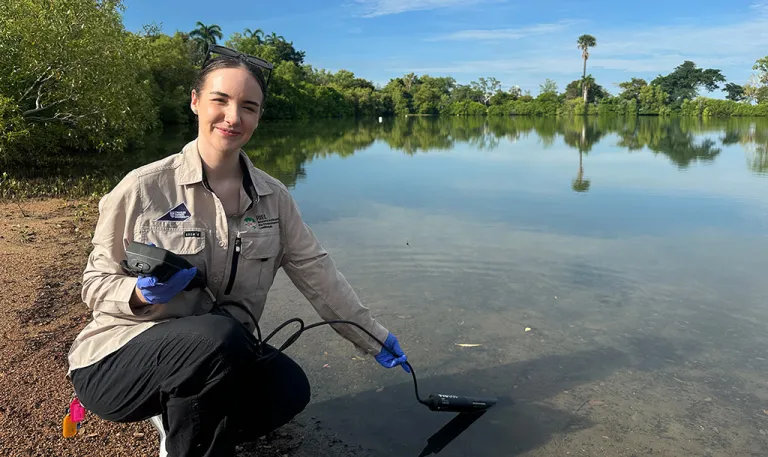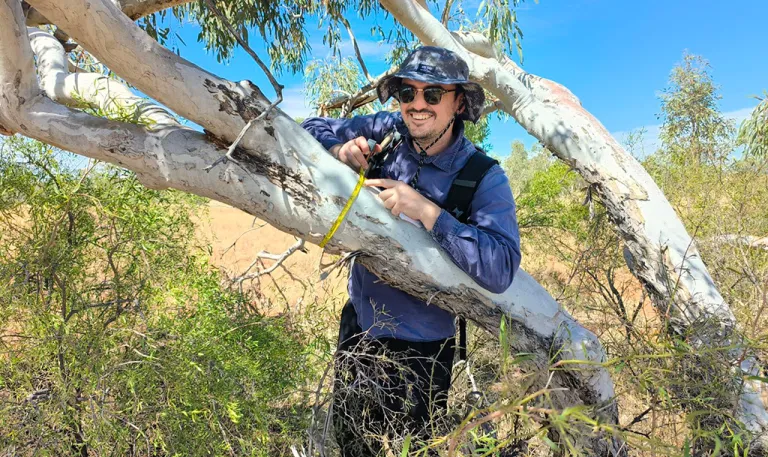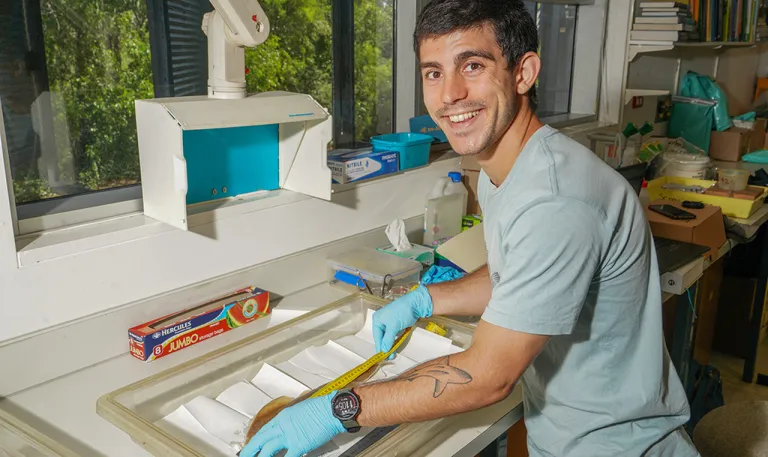Student stories
Why study an honours year? We ask three CDU students
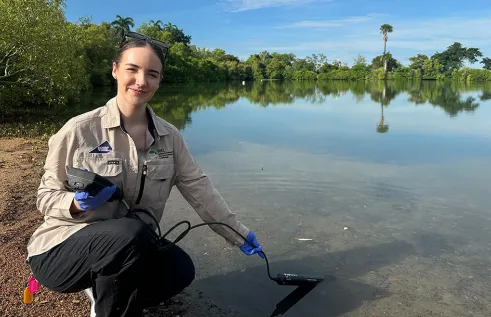
Upgrading your undergraduate degree with an honours year is becoming an increasingly popular choice for students looking to boost their career prospects or take the first step into research.
At Charles Darwin University (CDU), the honours program is designed to help students gain valuable research experience while developing advanced skills in analysis, communication, and problem-solving. It’s also open to students from other universities, with a stand-alone program that allows participants to focus deeply on a specific area of interest.
CDU’s unique location in northern Australia offers a distinct advantage, particularly for those in the environmental sciences. Its proximity to diverse ecosystems makes it a hub for innovative, real-world research.
Honours students often work on collaborative projects with government and industry partners, allowing them to make real-world impact while gaining hands-on research experience.
Range of disciplines
The honours course is typically completed over two semesters and includes a major research project. Students can choose from a range of disciplines, including biology, ecology, spatial science, analytical chemistry, exercise and sports science, medical laboratory science, pharmacy, information systems, mobile networking, and software development.
Graduating with honours can significantly enhance a student’s employability. As well as the in-depth subject knowledge gained through research, students also build a suite of transferable skills such as critical thinking, collaboration, and advanced written and oral communication that employers highly value.
For those considering further academic study, an honours year also provides the prerequisite research training needed to pursue a higher degree by research, such as a master's or PhD.
An honours qualification is not only an opportunity to deepen subject knowledge, but also a way for students to distinguish themselves, whether they’re aiming to enter the workforce or pursue a future in research or academia.
With growing recognition of the value of research and specialised skills in today’s job market, an honours year is proving to be a smart investment in the future.
Why else would you study an honours year? We asked three Bachelor of Science Honours students, each focussing on the environment, why they decided the extra qualification was right for them.
All of them have elected to do their honours course via CDU’s Research Institute for the Environment and Livelihoods, a recognised leader in tropical savanna research in northern Australia.
Amy Cook
Bachelor of Science Honours
Microbial source tracking and environmental factors influencing Enterococci contamination in recreational waters
Did you study for your bachelor’s degree at CDU or apply for a standalone honours year?
After relocating from Melbourne to Darwin in 2022 I completed my Bachelor of Science here at CDU.
What made you want to pursue honours?
I have always enjoyed the hands-on side of science, and honours felt like the perfect opportunity to work on a project that could have a real-world impact while still developing my skills.
After completing the undergraduate unit ENV323 (Environmental Microbiology), I got the exciting opportunity to work with the Bioscience North Australia team here at CDU, with whom I have worked for two years.
During this time, their leadership, supervision, and passion for their work inspired me and made me want to explore how microbiological research can support environmental management and water quality solutions.
Why was CDU/RIEL the right choice for you?
CDU and RIEL stood out because of their strong focus on research that directly supports environmental management in northern Australia.
The industry connections and the opportunity to work on projects that have local impact made it clear this was the right place to take on a project with both scientific and community relevance.
Are you planning on venturing into further research?
It's definitely on my mind. My honours project so far has confirmed how much I enjoy fieldwork, problem-solving and contributing to something bigger.
I'd love to keep working in environmental science, whether that's through further research, project work or even environmental consulting.
For now, I'm focused on my honours year, but I'm excited to see where this path leads.
James Pike
Bachelor of Environmental Science, Bachelor of Science Honours
Groundwater-dependent vegetation mapping using synthetic aperture radar
Did you study your bachelor’s degree at CDU or apply for a standalone honours year?
I moved to Darwin in January of 2020 to undertake my bachelor’s degree in environmental science at CDU.
What made you want to pursue honours?
I decided I wanted to pursue honours after taking two intensive units to finish my undergrad, specifically analysing and synthesising spatial data with Professor Hamish Campbell and researcher Dr Mariana Campbell, and environmental monitoring and modelling with environmental science lecturer Dr Richard Crabbe, who are all based at RIEL and the North Australia Centre for Autonomous Systems.
Why was CDU/RIEL the right choice for you?
CDU/RIEL was the right choice for me, given the breadth of work I’d seen happen under the banners and the lecturers who inspired me to pursue studies operating in that space.
Are you planning on venturing into further research?
I’m hoping to pursue further studies and expand upon what I’ve learnt this year on my current honours topic, loosely on groundwater-dependent vegetation in NT’s arid zone.
Sam Amini
(Bachelor of Science Honours)
Kinship dynamics of critically endangered Largetooth Sawfish (Pristis pristis) in the Daly River
Did you study your bachelor’s degree at CDU or apply for a standalone honours year?
I am doing a standalone honours year at CDU.
What made you want to pursue honours?
Throughout my undergraduate degree I worked on several research projects. This primarily involved remote fieldwork, data analysis, and scientific writing, which piqued my interest in research.
I've always enjoyed learning about the natural world, particularly about fish, sharks and rays.
Doing an honours course has allowed me to explore this interest further and broaden my experiences and skills.
Why was CDU/RIEL the right choice for you?
CDU was the right choice for me because of where it is placed and the work being done.
From a research perspective, there are so many unknowns about the fish, sharks and rays that inhabit the NT and northern Australia more broadly.
Plus, the chance to live in a new city and work in some of the most spectacular places in Australia made it an easy choice.
Are you planning on venturing into further research?
At this point, yes! I think I'll always want to be involved in science, research, and conservation in some capacity. There are too many questions to answer!
An honours course can take you nearly anywhere. Explore CDU’s honours courses and postgraduate courses.
Related Articles

Darwinite Alicia is joining the next generation of doctors
Instilled with an interest in health from an early age, Alicia's on the direct pathway to medicine through the Bachelor of Clinical Sciences at Charles Darwin University. She's part of the next generation of Territory doctors.
Read more about Darwinite Alicia is joining the next generation of doctors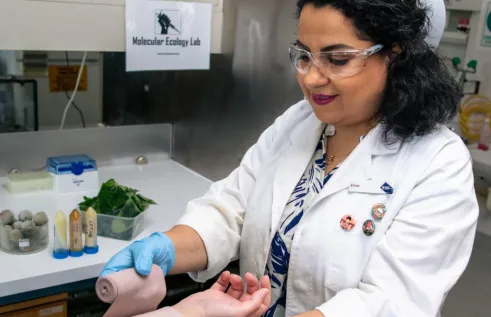
Healing wounds with native Top End plants
Dr Elnaz Saki has always been interested in natural remedies even when they lack scientific confirmation. Eager to bridge the gap between traditional wisdom and modern science, she's harnessing the power of plants found in Top End parks and gardens.
Read more about Healing wounds with native Top End plants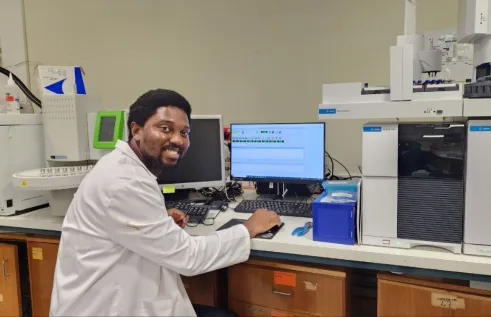
Life in plastic, it's (not so) fantastic
We are currently facing a plastic pollution crisis that impacts the health of humans, wildlife, marine and terrestrial environments, and even Earth’s climate system. Caleb Ojo, a Higher Degree by Research student at CDU, is trying to solve one of the plastic waste problems plaguing our beautiful planet.
Read more about Life in plastic, it's (not so) fantastic
